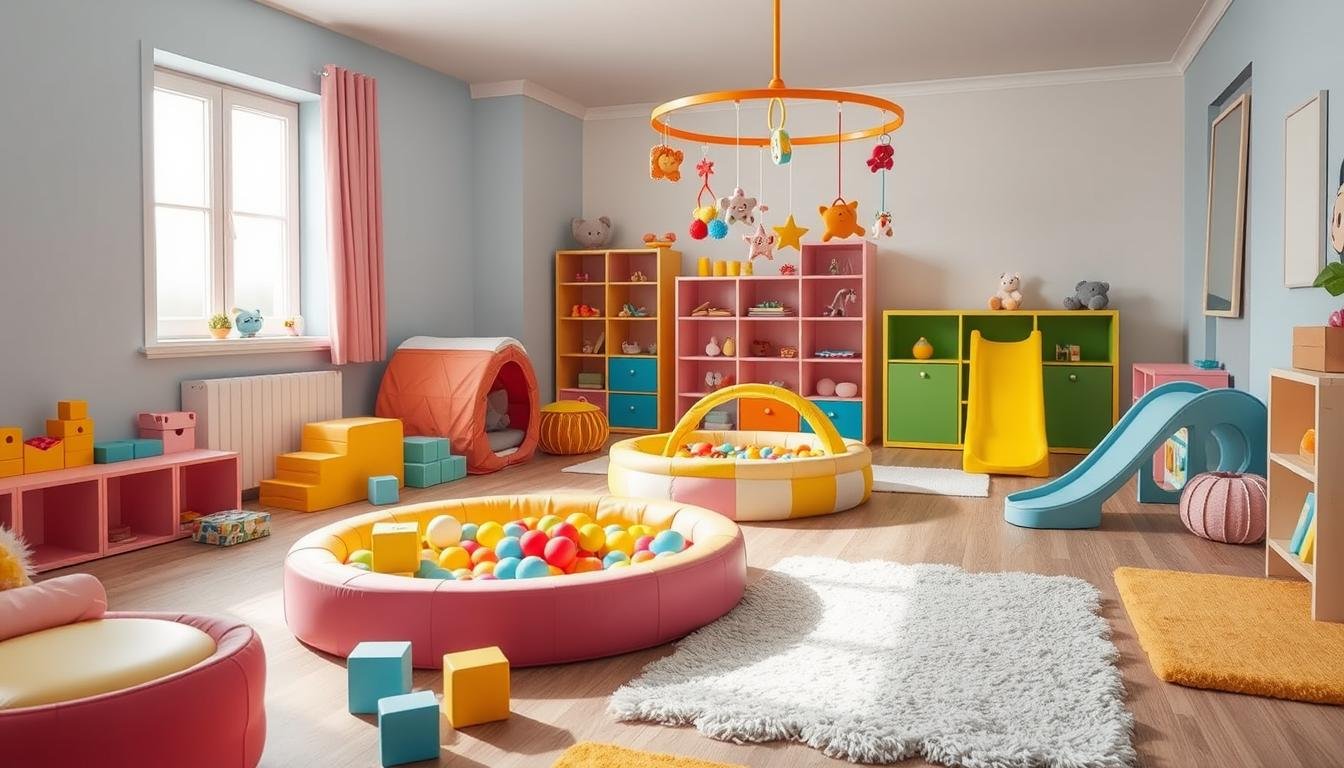It’s important to keep your baby active with fun activities. These help with their physical, cognitive, and emotional growth. This article will show you seven activities that are great for your baby. They help stimulate their senses and create special moments together.
These activities include stretching exercises with a mobile and exploring temperature differences. They are all about 7 Fun Activities to Keep Your Baby Active, infant physical development, baby exercises, interactive baby games, baby motor skills, infant playtime, baby fitness, newborn stimulation, engaging baby activities, and infant movement. Adding these fun experiences to your day helps your child grow. It also strengthens your bond with them.
Exploring Movement and Senses
Tummy Time with Visual Stimulation
Newborns have amazing reflexes that make tummy time easy for them. Start putting your little one on their belly early. Place black-and-white images or high-contrast patterns on the floor, about 8 to 12 inches from their face.
Lay your newborn across your lap, letting them look at these interesting objects. This helps them practice focusing, which is good for their eyes and keeps them active.
Sensory play activities for babies are very beneficial. They help with language and physical skills. These activities are key for brain growth in the early years.
Babies love exploring different textures for sensory fun. This helps them learn and grow.
As your baby gets older, they can try more sensory play, starting around 9 months. There are many fun activities, like taste-safe foods and easy games like burying objects in oats. These activities help their physical and mental growth.
7 Fun Activities to Keep Your Baby Active
Keeping your baby active is key for their growth. Fun activities can boost their senses, motor skills, and bonding. Here are seven fun activities to try with your baby:
- Tummy Time with Visual Stimulation: Place toys or bright objects near your baby during tummy time. This helps strengthen their neck and back. The American Academy of Pediatrics suggests 15-30 minutes of tummy time daily by 7 weeks.
- Sensory Exploration: Create a safe play area with different textures. Use a soft blanket, a crinkly foil mat, and a smooth mirror. Let your baby explore at their own pace.
- Baby Massage: Massage your baby’s arms, legs, and back with gentle, circular motions. This relaxes them and boosts their body awareness and motor skills.
- Interactive Baby Games: Play simple games like peek-a-boo or patty-cake. These games help with social and cognitive development.
- Reading Time: Choose colorful, high-contrast books and read aloud. Pause to let your baby explore the pages and interact with the story.
- Music and Movement: Sing nursery rhymes, clap, and sway with your baby. This promotes rhythm, language, and motor skills.
- Treasure Hunt: Make a “treasure basket” with safe, household objects. Fill it with different textures, shapes, and colors for your baby to discover.
Every baby grows at their own pace. Tailor these activities to your baby’s interests and abilities. Engage in these fun activities to support your baby’s growth and development.
Sensory Exploration
Unlock your baby’s senses with fun activities. These can include temperature play and texture exploration. They help stimulate baby senses and promote infant stimulation.
Temperature Play
Explore temperature with your baby. Use cotton balls dipped in cool and warm water. This lets them feel the difference in temperature play.
This activity helps your baby learn about their body. It also brings you closer through touch.
- Dip cotton balls in cool and warm water
- Gently stroke your baby’s face, hands, and feet
- Observe their reactions and engage with them
- Promote sensory exploration and body awareness
As your baby grows, introduce different textures. This can be from soft fabrics to rough burlap. It helps them explore the world through touch.
Bonding Through Baby Massage
Touching your baby gently can be very rewarding. Baby massage helps them relax and sleep better. It also affects their stress hormones positively. Find a quiet, comfy spot, lay a soft blanket, and place your baby on their back.
Use smooth strokes to massage their body, arms, and legs. This way, you bond with your child. These moments of touch and eye contact reduce stress for both of you. Studies show it can improve sleep by 50% and reduce colic by 30%.
- Massage your baby at the same time each day, like before bed or after a bath.
- Use gentle, circular strokes and avoid applying too much pressure.
- Add soothing music or calming scents, like lavender, to the atmosphere.
- Listen to your baby’s cues and adjust the massage as needed.
Baby massage is a simple yet powerful way to support your child’s growth. It strengthens the bond between you and your baby. By making these moments peaceful and mindful, you help your baby feel safe and loved.
Developing Visual Focus
Your baby’s vision is still growing in the early stages of life. At first, their focus is limited, but with time and the right activities, they’ll get better. Fun, visually-focused games can help them grow.
Newborns see best in black and white because it’s high contrast. Start with small toys or rattles in these colors. Hold the item 8 to 12 inches from your baby’s face. Wait for them to look at it, then slowly move it to help them track.
- Around 4-5 months, infants start to understand “cause and effect” in play. Use interactive toys that make them respond.
- By 7-8 months, babies know that objects still exist even when they can’t see them.
- Reading storybooks out loud helps your baby recognize voices and sounds. It’s good for their brain.
Playing visually-stimulating games helps your baby’s vision and learning. It also boosts their memory and senses. Make sure the games are fun, safe, and right for their age to help them grow.
The Joy of Reading
Reading to a newborn might seem odd at first. But, it brings them great benefits. Your voice and scent calm them, letting them see and understand the world. From birth to age 3, they go through stages, from finding comfort in stories to exploring and pretending to read.
Starting early literacy is key in a child’s first years. Simple steps like pointing out letters and playing rhyming games help. Even if they don’t get the words, talking to them boosts their brain for language.
Parents and caregivers are crucial in fostering a love for reading. By introducing reading and language early, you help build a strong vocabulary. This sets the stage for a lifetime of learning and literacy.





